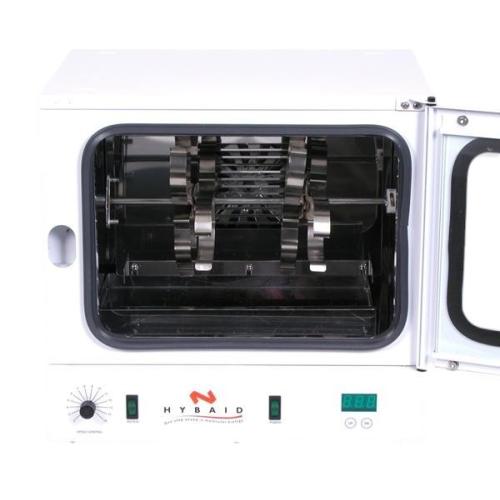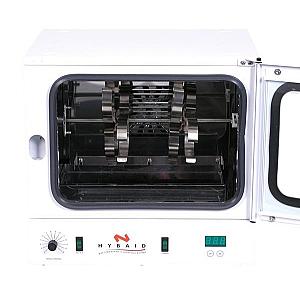The Applied Biosystems GeneChip Hybridization Oven 640 is designed to automate and standardise the process of hybridising probes on GeneChip microarrays. With its precise temperature control and continuous rotation system, it guarantees consistent and reproducible results. Its ability to process up to 64 samples simultaneously, combined with a digital display of the rotation speed, makes it an essential tool for genomic research laboratories. Compact, reliable and secure, this equipment optimises workflow and improves the consistency of molecular biology experiments.
Microarray Hybridisation Oven - Good Condition 2006


Offer Details
Accessories :
41199
Options :
10-14 working days
Description
Applied Biosystems GeneChip Hybridization Oven 640: a reliable system for microarray hybridisation
The Applied Biosystems GeneChip Hybridization Oven 640 is an instrument specifically developed to meet the needs of genomics and molecular biology laboratories using GeneChip microarray technology. Hybridisation of probes on these media requires temperature accuracy and homogeneous mixing of the cartridges in order to obtain reliable and comparable results from one experiment to the next. The Hybridization Oven 640 meets this requirement by combining rigorous temperature control with a continuous, uniform rotation system. This device prevents hybridisation variations between samples, thereby ensuring better analysis quality.
High capacity tailored to the needs of modern laboratories
With a capacity of up to 64 probe cartridges, the GeneChip Hybridization Oven 640 can process a large number of samples in a single run. It is equipped with removable racks that can hold eight cartridges each, offering great flexibility in workflow organisation. Researchers can insert or remove sets of cartridges without interrupting the entire process, which is a major advantage in a busy experimental environment. The cartridge holders are also colour-coded, simplifying identification and handling on a daily basis.
Ergonomics designed for precision and safety
The furnace has a digital display for real-time monitoring and visualisation of the carousel rotation speed, which can be adjusted from 0 to 80 rpm. This flexibility ensures optimal adaptation to the specific requirements of experimental protocols. The device is also equipped with a door locking system, ensuring user safety and automatically stopping rotation when the door is opened. Its compact and robust design, which complies with international safety and electromagnetic compatibility standards, is a testament to its reliability and durability.
The GeneChip Hybridisation Oven 640 is therefore an essential piece of equipment for research laboratories working with microarray technologies, combining precision, flexibility and safety for reproducible and standardised experiments.
Features
- Capacity for 64 probe cartridges simultaneously
- Removable, colour-coded cartridge holders for easy handling
- Digital display for real-time adjustment and monitoring of rotation speed
- Uniform temperature control ensuring stable conditions for hybridisation
- Safety system with door lock and automatic rotation stop
- Robust design for consistent, reliable performance
- Available in 110V and 220V versions to suit different laboratory environments
Technical Details
- Dimensions: 48 cm (H) x 46 cm (W) x 38 cm (D)
- Weight: 22.7 kg
- Power supply:
- 90V-132V @ 47Hz-65Hz (110V)
- 190V-264V @ 47Hz-65Hz (220V)
- Power consumption: < 1000 VA (110V, 220V)
- Temperature range: Ambient +5 °C to 70 °C
- Temperature accuracy: ±0.4 °C at calibration point
- Temperature accuracy: ±2.0 °C between 30 °C and 60 °C
- Carousel rotation speed: 0–80 RPM
- Operating conditions:
- Ambient temperature: 15 °C to 30 °C
- Relative humidity: 15% to 85%
- Standards: CSA (North America), CE (European Union), IEC, LVD and EMC
Compatible Accessories
- GeneChip cartridge holder:
- Red (ref. 200289)
- Green (ref. 200290)
- Purple (ref. 200291)
- White (ref. 200292)